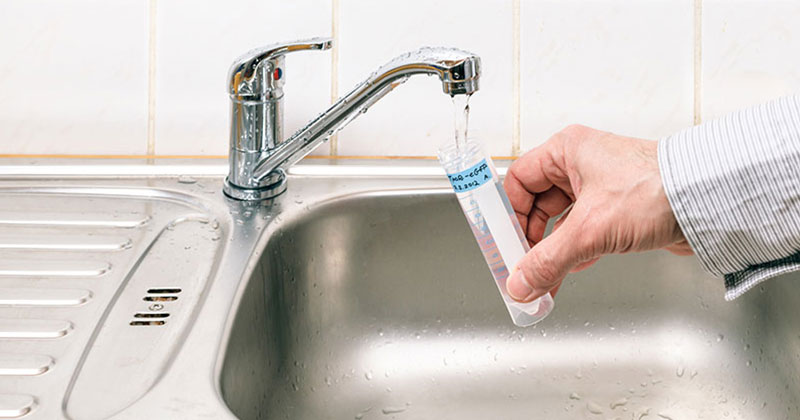Getting My Well Water Testing To Work
Getting My Well Water Testing To Work
Blog Article
Well Water Testing Fundamentals Explained
Table of Contents10 Easy Facts About Well Water Testing ExplainedThe Buzz on Well Water TestingThe Only Guide for Well Water TestingThe Basic Principles Of Well Water Testing

Federal government firms do not keep track of or manage water top quality in personal wells, and water screening is not called for by any kind of federal or state guideline. If you are among the 1. 7 million Georgians with an exclusive well, you are in charge of the quality and security of your well water.
Appropriately constructed and preserved water wells can supply years of hassle-free solution. Surface area impurities may get in the well if it is not appropriately built and maintained, and the well might eventually degrade or end up being harmed as it gets older. Additionally, some groundwater naturally consists of several chemical substances at levels above the EPA's health-based requirements, called the Maximum Pollutant Degrees (MCLs)
Check the water as soon as annually for overall coliform bacteria, nitrates, total liquified solids and p, H degrees. If you believe various other pollutants, you need to examine for those. In comparison, the top quality of water in faulty wells may transform all of a sudden and remain undetected as the water might look, odor and taste the same.
9 Easy Facts About Well Water Testing Shown
Minimum Testing Recommendations Well, Maintenance Annual All geographical areas Nitrates (Total Nitrate and Nitrate+Nitrite) Annual Yearly Fundamental Water Chemistry (see below) plus Alkalinity, Soluble Salts (or Overall Dissolved Solids), Nitrate, Chloride, Fluoride and Sulfate Initially and afterwards every 3 years p, H, Solidity, Light Weight Aluminum Calcium, Chromium, Copper, Iron, Magnesium, Manganese and Zinc Every year after initialcomprehensive water chemistry Added Testing Recommendations Verification of Possible Contamination A minimum of as soon as and after that annual follow-up for:1) residences with pipes that pre dates the 1987 plumbing codes with copper piping with lead solders2) older homes in which there are lead pipes3) residences with brass and/or chrome components (brass contains 3-8% lead; chrome fixtures includes lead) All geographicalregions At least as soon as and afterwards an annual follow-up Southern Coastal Level area below the "Loss Line" on the, Georgia map At the very least when and after that a yearly follow-up Piedmont-Blue Ridge regions over the "Fall Line" on the Georgia map Volatile and click for more info Semi-volatile Organic Substances, Pesticides, Oil Hydrocarbons and Various other Organics Not needed on a routine interval; recommended only when contamination is presumed. Well Water Testing.
Samples collected from a kitchen area tap would show the source water residential properties plus any kind of prospective contamination from the well proprietor's water system system. As an example, sampling at the wellhead for lead is not essential, however tasting from the faucet for lead would suggest if lead solder was used in the pipes.

The main MCLs have actually been set at focus that offer a large margin of defense from damaging health effects for the majority of people over a lifetime of drinking. Also though primary MCLs are enforceable requirements for PWSs just, exclusive well owners may select to comply with these standards to protect themselves from the potential health risk of drinking contaminated water.
Things about Well Water Testing
The alcohol consumption water criterion for nitrate is 10 ppm; above this level nitrate can have adverse effects on human wellness, especially infants under the age of 6 months. Pesticides are materials used to stop, destroy, ward off, or reduce bugs.
Cyanazine breaks down in the environment into various chemicals. Several of the breakdown products of cyanazine have been discovered in Minnesota water. Pesticide evaluation in water examples can be costly and using details pesticides can differ throughout the state making it hard to know which pesticide to evaluate.
Based upon this, we recommend that you call the MDA prior to sampling your well for chemicals. The collective or intensifying wellness threat connected with reduced levels of numerous chemicals in drinking water is not well understood at this time. Well Water Testing. Generally, susceptible populaces such as babies, youngsters, and pregnant/nursing females are at greatest danger
We are currently sampling wells for nitrate in towns with vulnerable groundwater which have significant row crop manufacturing for nitrate as part of the Municipality Screening Program (TTP). More than 70,000 private wells proprietors will be used nitrate testing in over 300 townships. Property owners are used a chemical examination through the Private Well Chemical Tasting (PWPS) Task if nitrate is spotted in their very first town screening sample.
Well Water Testing Fundamentals Explained
The MDH advises using an accredited research laboratory to evaluate your water. To identify a laboratory to have your well water tested, go to Minnesota Department of Wellness (MDH) Licensed Ecological Laboratories. The personalized search tab on this web page enables you to look for a lab that accepts samples from exclusive homeowners.
When feasible, it is best to remove resources of contamination or replace a polluted water system with a safer water supply rather than rely upon a home water treatment system. Also, the expense to check for pesticides in water might surpass the expense of a point-of-use home treatment system, such as reverse osmosis for alcohol consumption water.
If you determine to mount a home water treatment system, the unit (or systems) you choose must be accredited and identified to minimize or eliminate the compound you are concerned concerning. If there is greater than one compound you want gotten rid of from your water, you might need to integrate a number of therapy procedures into one system.
Report this page